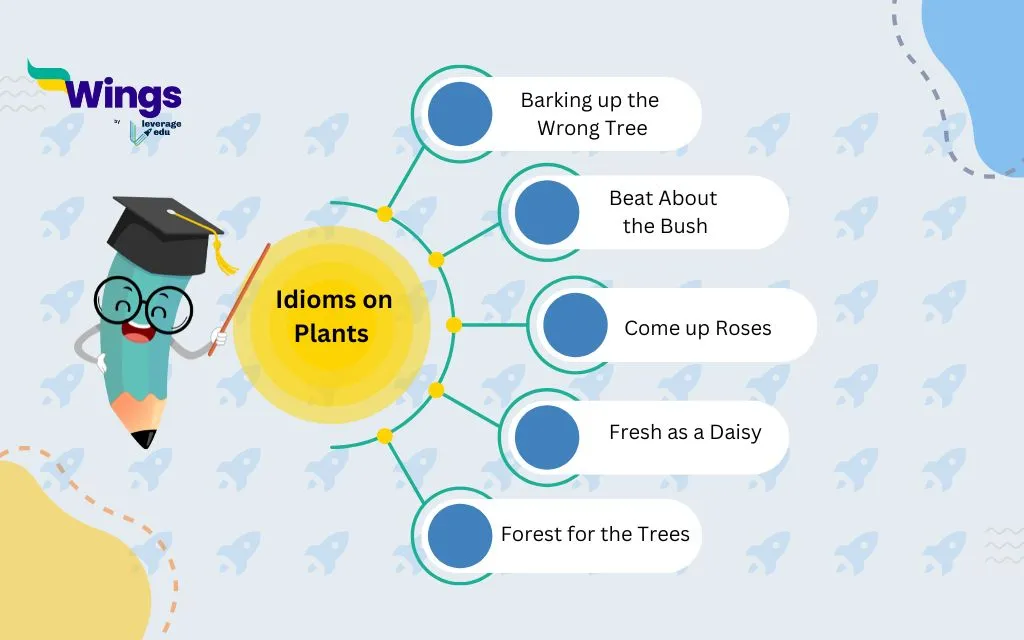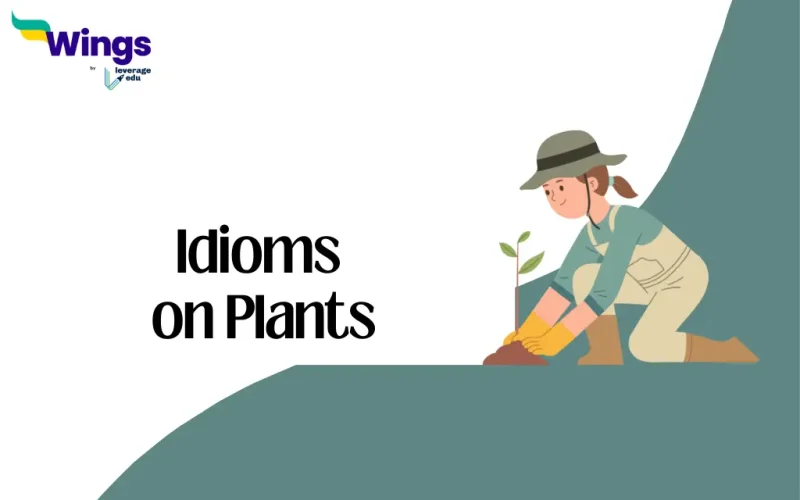Idioms on plants carry rich, symbolic meanings that show the beauty and complexity of nature. These words use the imagery of blooming gardens, growing trees, and blooming flowers to communicate insights about growth, life, and personal development. In this blog, we will talk about some of the most popular idioms where you can draw inspiration from plants, discover their meanings and understand how they can be applied to the various aspects of our lives.
This Blog Includes:
Also Read: Best Idioms with Examples and Meanings
Idioms on Plants To Improve Your Writing
Idioms related to plants can help your writing bloom and become more vivid. Exploring these plant-themed idioms will improve your writing and make it more interesting and expressive.

Barking up the Wrong Tree
| Meaning: “Barking up the wrong tree” indicates making a mistake by focusing on the wrong thing or blaming the wrong person for a problem. |
Example: If you’re accusing your colleague of losing an important document, but it turns out it was misplaced by someone else in a different department, you are “barking up the wrong tree.“
Beat About the Bush
| Meaning: The idiom “beat about the bush” indicates avoiding talking directly about the main topic or being vague in what you are saying. It usually implies that someone is avoiding getting to the point of discussing something important. |
Example: If you are asking your friend why they were late, and they keep talking about other small details or giving excuses that don’t address the main issue, you might say, “Stop beating about the bush and just tell me why you were late.”
Come up Roses
| Meaning: It signifies to successful, or to have everything going well. It suggests a smooth and positive outcome, similar to a rose blooming perfectly. |
Example: After months of hard work and studying, Maria was worried about her final exams. But everything went well, and she came up roses with top grades.
Fresh as a Daisy
| Meaning: The idiom “fresh as a daisy” implies feeling very energetic, refreshed, or alert. It is usually used to describe someone who looks or feels bright and full of energy as if they have just woken up or had a good rest. |
Example: “After a good night’s sleep, she felt fresh as a daisy and was ready to start her day.”
Forest for the Trees
| Meaning: The idiom can’t see the “forest for the trees” indicates being so focused on the small details of something that you miss the bigger picture. |
Example: If you are spending hours tweaking a single slide in your presentation but ignoring how the overall message is coming across, you might be missing the “forest for the trees.“
Also Read: Top 10 Idioms for Help You Should Know!
Lead Up the Garden Path
| Meaning: “Lead someone down the garden path” indicates to mislead or fool someone often by making them believe something that isn’t true. |
Example: The politician had led the public up the garden path with empty promises of economic prosperity.
Money Doesn’t Grow on Trees
| Meaning: It indicates that money is not easy to come by and that it requires effort to earn. |
Example: “Money doesn’t grow on trees,” my dad would always say, reminding me to appreciate the value of hard-earned cash.
Nip it in the Bud
| Meaning: The idiom “nip it in the bud” suggests that one should stop something at a very early stage before it becomes a bigger problem. |
Example: We need to address the team’s morale issues now and nip them in the bud before they affect productivity.
To Reap What You Sow
| Meaning: It indicates that you will face the consequences of your actions whether they are good or bad. |
Example: After years of mistreating her employees, the boss is now reaping what she sowed as no one wants to work for her.
Kick the Bucket
| Meaning: Kick the bucket suggests that one should stop something at a very early stage before it becomes a bigger problem. |
Example: The old man finally kicked the bucket last night.
Also Read: 19+ Idioms on Body Parts To Give a Boost to Your English
5 Idioms on Plants, Flowers and Trees
Idioms involving plants, flowers, and trees often use nature-related imagery to express various ideas and emotions. Understanding these will allow us to appreciate how language can capture the essence of nature in day-to-day talks.
Beat Around the Bush
| Meaning: ‘Beat around the bush” points to avoid talking directly about an important or difficult topic. Rather than addressing the main point, someone might talk around it, giving outside details or being vague. |
Example: When asked if he would take the job, Rohit beat around the bush, talking about everything except his decision.
Old Chestnut
| Meaning: The idiom “old chestnut” refers to a joke, story, or idea that has been repeated so many times that it has become boring or stale. It is like repeating the same old joke or story repeatedly. |
Example: During the family gathering, Uncle Joe told the same old chestnut about his high school football days, and everyone rolled their eyes because they had heard it a million times before.
| Meaning: It usually represents someone who appears to be in great health and high spirits, especially after a rest or a break. |
Example: After a good night’s sleep, she woke up feeling as fresh as a daisy, ready to tackle the day’s challenges.
Pushing up the Daisies
| Meaning: When someone says a person is “pushing up the daisies,” they indicate that the person has died and is buried underground where flowers might grow above their grave. It’s a creative and less direct way to talk about death. |
Example: After years of dealing with his mischievous antics, old Mr. Rajat finally passed away. The neighbourhood kids now joke that he’s pushing up the daisies in the old cemetery down the road.
Lead up the Garden Path
| Meaning: “Lead someone up the garden path,” you make them believe something that is not true. You might give them incorrect info or promises causing them to be confused or deceived. |
Example: Jenna was led up the garden path by her friend Mark who promised her a high-paying job at his company.
Also Read: Top 10 Idioms for Success That You Should Know!
Check out more blogs on Idioms and Proverbs
FAQs
It’s a phrase that uses plant-related imagery to convey a meaning. For example, “to plant something on someone” tells to secretly place something illegal on them or their belongings.
One of the most common idioms for leaf is: “Turn over a new leaf” which suggests deciding to change your behaviour or actions to improve your life.
The phrase “green thumb” describes someone very good at growing plants. For example: Whenever I buy a plant, it dies quickly. I don’t have a green thumb.
This was all about the idioms on plants. You can also follow the Learn English page of Leverage Edu for more exciting and informative blogs related to English grammar and the English language.


 One app for all your study abroad needs
One app for all your study abroad needs












 60,000+ students trusted us with their dreams. Take the first step today!
60,000+ students trusted us with their dreams. Take the first step today!